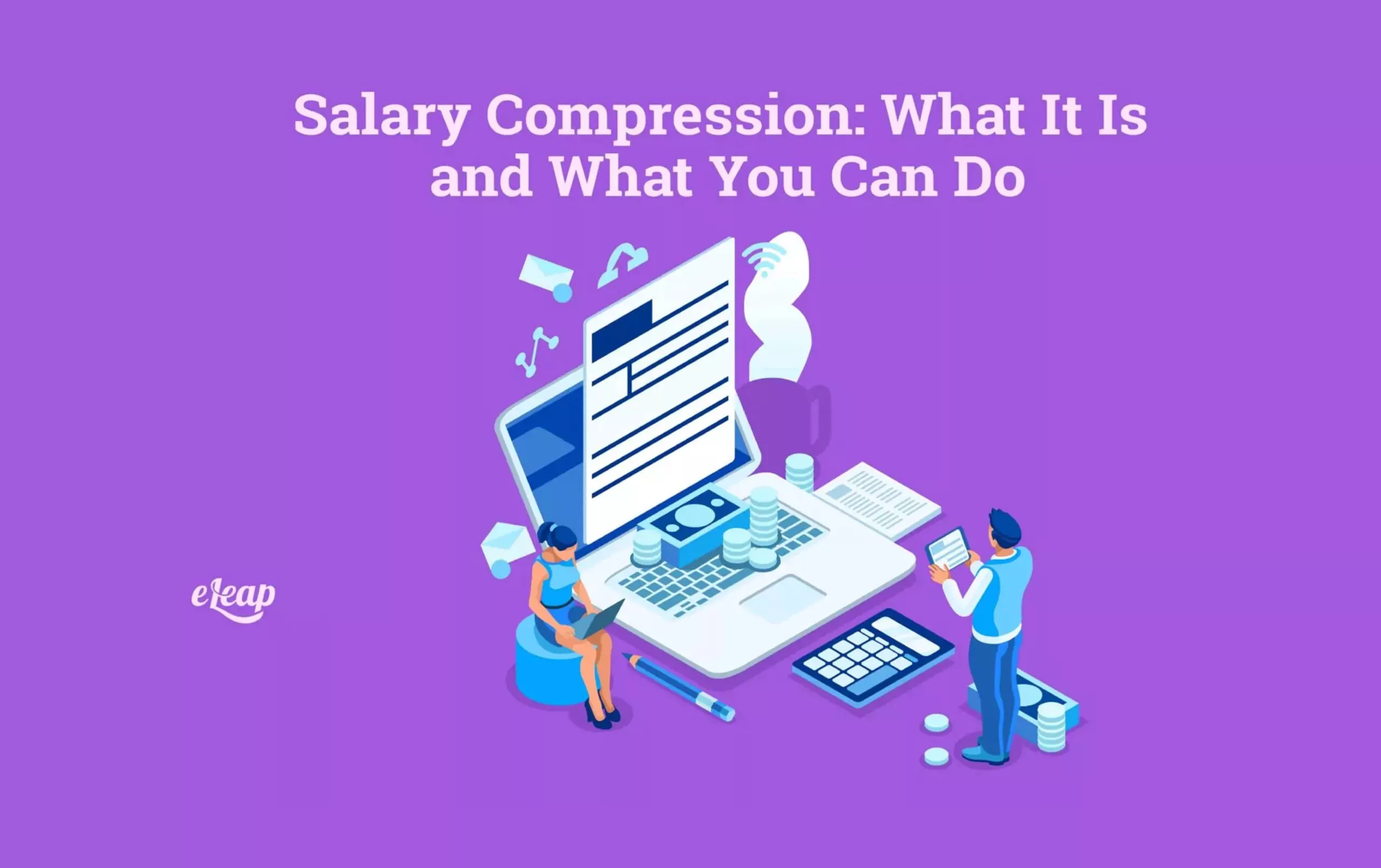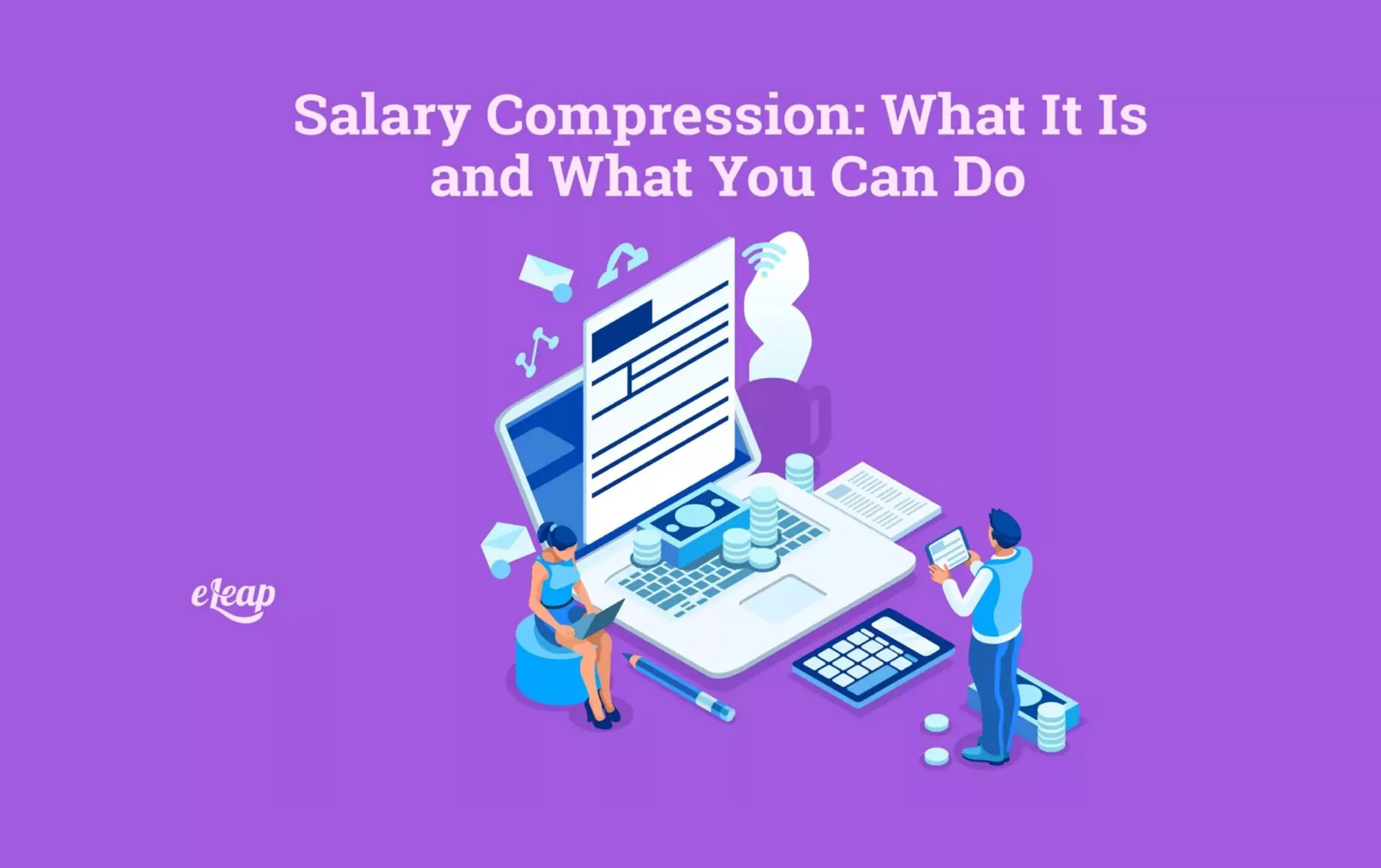Salary Compression: What It Is and What You Can Do

The changing labor market is creating a lot of different priorities that can be hard for companies to juggle. In addition to all the changes and improvements in things like company culture and benefits, compensation is a big topic of discussion right now. Employees want competitive, transparent, and equitable pay, and they aren’t afraid to demand it. Explore how eLeaP’s Performance Management Platform can simplify evaluations, boost productivity, and drive measurable results.
Unfortunately, some companies aren’t quite ready to deliver here—or they think they are, but they’re missing the mark by hiring new people at wages that compete with their most seasoned staff. Welcome to salary compression.
When HR leaders and company management are dedicated to improving compensation strategies and ensuring fair pay for both existing and new employees. They create an organization that has a reputation for being not only fair but focused on equitable pay throughout. When these things are overlooked and compensation strategies aren’t updated, that’s when you can end up with salary, or wage compression.
The Causes of Salary Compression
Several different situations can lead to wage compression. Understanding the cause is often the best way to alleviate the issue, but it’s important to get to the root of what’s going on. Otherwise, employees will be left feeling frustrated and unappreciated. And you could face losing some of them. Take the time to learn about the common causes of inequity in pay so that you’re ready to address the issues before they become a big problem for the company.
Arbitrary Structures for Compensation
The first and most common issue when it comes to salary compression is that companies have random, arbitrary compensation structures. They may hire people at whatever rate they deem is fair at the time. But that may not continue to be a fair rate as they grow and develop in their position.
A lot of companies do performance reviews and offer annual raises that are nominal at best. Some places offer as little as a 25 to 50-cent increase or no increase at all.
This is how you end up with seasoned employees who are earning the same (or less than) new hires who have just walked in the door. That’s also how you end up with a huge employee morale issue if you don’t address the unfair compensation. It’s suggested that wages be revisited more frequently. Companies stop using arbitrary systems to determine pay increases and start paying people what they’re worth.
It’s not unheard of for someone to go from making $10 per hour to $15 per hour in just a few years, and when you’re hiring new people at $13, you’d better be paying your existing staff more. Come up with a new compensation structure that’s fair and actually makes sense.

The Tight Labor Market
Right now, the labor market is tight. That means that new talent is even more expensive and it’s coming at a premium these days. Unfortunately, that also happens at the expense of existing employees who have been with the company and are still earning a lower salary simply because they were hired at a different time.
It’s tempting for companies to offer higher starting pay for people when they are eager to find help. But those companies also have to remember their existing employees. If you think the labor market is tight now, imagine if you start losing even more employees because you don’t find a way to create equity in pay.
Increases in the Minimum Wage
When the federal or state minimum wage increases, a lot of companies see issues with salary compression. If a state increases the minimum wage to $11 per hour and a current employee that’s been around for a few years is only earning $11.50. That’s fifty cents more for much more experience and tenure with the company. In some cases, those existing employees might only be earning $10.75. Which means the new hires are earning more from day one.
Whether you encourage it or not, word’s going to get around. Employees talk and if they learn that they’re not being fairly compensated, they’re going to speak up. Worse yet, they may just slack off in their job duties because they feel underappreciated. After all, they’ve given four or five years of their life to the company, while the new guy that’s making just a few cents less, just started yesterday—employees have a right to be frustrated with this.
What can you do? When there’s a minimum wage increase, use it as a chance to revisit current employees’ salaries or hourly rates and make sure that they’re being fairly compensated. Some companies think it’s impossible to just bump someone’s pay, but it is that simple. If Bob is twice as valuable as the new guy but he’s earning the same amount, he’s probably not going to stick around. It doesn’t matter why it hasn’t been increased more until now. All that matters is that you make the change when it’s needed.
What Can Happen with Unaddressed Salary Compression?
When you have salary compression in the organization, you are going to see a lot of negative implications as a result. For starters, there are legal implications to consider. Such as a potential lawsuit from someone who feels they’ve been unjustly compensated because a new hire was just put on the payroll. At the same rate and they’ve been working for the company for five years. It’s rare, but it does happen.
More commonly, companies see issues with leadership, employee culture and morale, and turnover.
The Impact on Human Capital
When someone learns that they aren’t making much more than new hires, or that those new hires end up being paid more for a lower-level position, it can affect their interest in staying with the company. After all, they’ve spent years working and building their careers. And they expect to be compensated equally for that. Unfortunately, wages haven’t increased as much over the years as they probably should have. So it’s often that companies run into this issue.
Salary compression can cost you valuable employees and cause your retention rates to suffer extensively.
Culture and Morale Will Drop
People who don’t feel fairly paid will lose faith in the organization and stop trying to go above and beyond. The implications of wage compression on culture are massive. Because more employees are willing and open to discussing their wages. Employees may learn they’re not earning much more than the new guy. And that can lead to a drop in morale. If they don’t leave the company, they’ll likely become an employee that does the bare minimum to get by.
Of course, it’s not just that one person. If there is salary compression in an organization. It is noticed by a lot of employees and will hurt the company’s overall culture and morale in many different ways.
Legal Challenges May Present Themselves
While there are no actual laws regarding wage compression specifically. You could end up with a discrimination lawsuit on your hands if you pay someone more than another individual with a similar job description. Even if the legal battle is impossible and difficult to prove since there is no real “reason” for the inequity, just the thought of being accused of discrimination is enough to make most companies course-correct. When there’s no obvious reason why two people earn different amounts of money. There’s going to be a lot of animosity and a few assumptions might be made based on everything that’s happening.
The other issue is that the entire company’s morale will fall to pieces. Because when other employees see one filing a lawsuit or complaining about wage compression. They lose their trust in the employer or at least question it, which is never a good sign.
Proactive Approaches to Avoid Salary Compression
The best thing that you can do is prevent salary compression at all costs. That starts by knowing the market rates and making adjustments as things change. No more 25-cent raises once a year and no more raises based on company goals or objectives. People should be paid more because they deserve to earn more as they develop their skills and secure their position within the company over the years.
Match the market rate whenever you can, or get as close as possible. If you can’t pay people what you think you should just yet. At least explain why and let them know when the increase will come. This will also involve reviewing employee files to check for pay equity across the board. This can be a little more complicated and time-consuming, but it’s important to ensure that you don’t end up with salary compression.
Address the Issues and Take Accountability
It’s hard to admit when you’re in the wrong. And it’s even harder to start giving people the raises that they deserve when you’re already on a tight budget. However, you need to take accountability and resolve the salary issues before you start losing the most valuable members of your team.